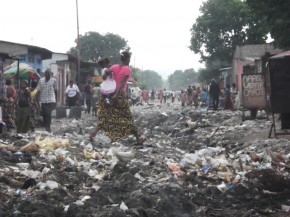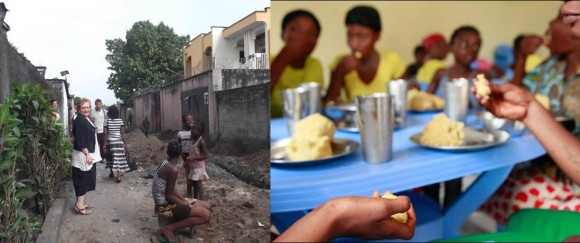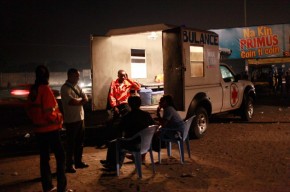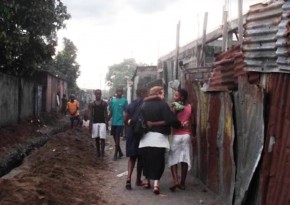A guest blog by Susanna Moorehead, DFID West and Southern Africa Director, about her recent visit to a center for girls living in the street in Kinshasa.
During my recent visit to DRC, I witnessed life in the huge, vibrant but troubled capital city, Kinshasa.

Picture: DFID DRC
In the tree-lined streets of Gombe, the diplomatic quarter on the banks of the Congo River, I discussed questions of governance, the mining sector, the business environment and donor coordination with the Prime Minister. Then, I travelled to Kimbanseke, the poorest commune of Kinshasa, a sprawling settlement of slum dwellings off the airport road. There, I visited a centre for girls living on the street supported by War Child UK *. I toured the centre and met staff. The 30 or so girls who live at the centre were engaged in a lively maths class; for many of them it is the first chance they have had to access any form of education. Finally, I had the opportunity to sit with eight of the girls and talk to them about their lives, experiences and the support that the centre offers.
Claudine's story is typical: her mother died when she was 9 years old and her father married another woman. The family was poor and there was often not enough food. Claudine was accused of witchcraft and fled her home. She started to beg on the street. After a few days, she met an older girl, a yaya (big sister in Lingala, a Congolese language), who helped her to 'look for money' (initiated her into prostitution). Claudine earned between 500-1,000 Congolese Francs (US$ 0.6 - $1.2) per client and was obliged to give the money she earned to the yaya in return for food and protection. Claudine lived like this for 3 years. She was raped several times, including by soldiers based at the nearby camp. The last time she was raped, she became pregnant and fell very ill. The yaya brought her to the day centre for street children based in Matete to get medical treatment. Claudine now visits the centre most days. She has just started literacy lessons and after the birth of her baby, she hopes to start vocational training as a beautician. She dreams of being one of the country's top beauticians and, one day, she says that she wants to use some of the money she makes to help other street girls.

Pictures: DFID DRC / War Child
According to aggregated development statistics, Kinshasa province performs well relative to other provinces of DRC and few international aid agencies support programmes there. Yet, scratch below the surface and a very different picture emerges. Everyday life is especially difficult for women and girls in Tshangu. In this situation, many women - especially adolescent girls - resort to risky livelihood strategies such as transactional sex and commercial sex work - sometimes encouraged by their own families; sometimes after fleeing from home. Locally-collected data** reveals high and increasing numbers of girls living and working on the streets and a widespread phenomenon of "filles-mères" (girl-mothers) in the district. These vulnerable girls and young women are often excluded from school, unable to access healthcare and exposed to HIV, sexually transmitted infections, and both sexual and physical violence. There are very few services targeted at them, apart from a few day centres and vocational training centres run by local or international NGOs.

Picture: War Child
The project’s main activities are providing street children with support including a mobile 'night-ambulance' offering immediate access to medical and psychosocial support, a 24-hour drop-in centre, counselling, medical support and referral. Where possible, girls are reunified with their families or other long-term solutions are sought. Awareness-raising campaigns to promote awareness of children's rights are being undertaken to tackle negative community attitudes towards street girls, so as to address stigmatisation and other factors preventing family reintegration, such as peer influence, behavioural difficulties, lack of income, lack of education and of employment opportunities. My experience in Kinshasa reflects some of the challenges facing both our programme and staff in DRC. On the one hand, we need to engage politically at the highest level if we are to support real change for the people of DRC. While on the other we need to have enough knowledge and understanding of how people live, and in particular, the poorest and most vulnerable, to be able to listen to their views, and respond appropriately. The Secretary of State for International Development, Justine Greening, recently announced a package of new measures to support women and girls living in poverty and has repeated her determination to step-up the UK government’s implication in front of the Commons. At the same moment, the Parliamentary Under Secretary of State, Lynne Featherstone, attended the United Nations Commission on the Status of Women in New York to make sure the UK plays a leading role in protecting women and girls rights.
DFID DRC is exploring ways of funding innovative work, specifically in relation to catalysing better results for women and girls. The challenge then, is how to use the lessons learned from this work to influence the policy and practice of key partners, as well as tackling damaging social norms and practices that leave Claudine, and thousands like her, with no other option but to live on the streets of Kinshasa.

Picture: DFID DRC

2 comments
Comment by Augustin K posted on
Welldone to all those that are involved in really trying to solve this problem of, not only the girls on the street, but all street children. This issue is a shame to humanity and not normal human being can sit back watch a girl àf nine be turned to a prostitute. Let's go back to HUMANITY.
Comment by Charles Leister posted on
Dismal virtual glimpses of the Congo are what we get these days. It’s so refreshing to hear news of positive developments there.
Outside assistance organizations do great good and are essential, but it’s the amazing and sustaining Bantu people of central west Africa who make programs work.
The DFID DRC initiative is admirable. I have friends working near Goma, with the movement “Sons of Congo”, to help men better understand the importance of correcting attitudes about sexuality, and the importance of women in a society. Does DFID know about this program?
As a sixteen-year resident of Zaire, as it was then known, I had the opportunity to become deeply involved in rural development programs. As an author, I’ve recently had the opportunity to rethink what really guaranteed successful initiatives. Mainly, especially in the seventies, women working in or close to government were doing amazing things.
One example: Citoyenne Mpinga Kasenda, wife of a prime minister who had great promise, worked behind the scenes and motivated important change.
Do any such ladies exert their critically important influence in the DRC today?
Thank you.